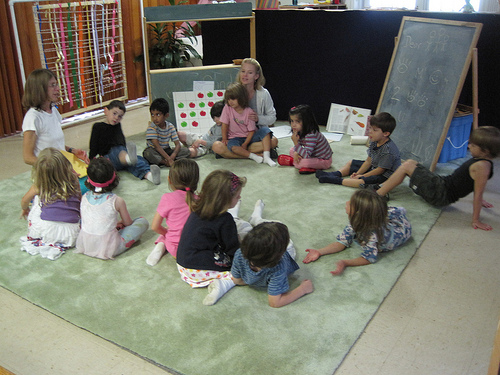 In September, my son George will be making the transition to full-time school. For two years, he was going to school one day a week (he is in the “mild intellectual disability” program at the public school), and for the other four days he was going to the therapy centre to undergo IBI. For those not familiar with the term, IBI stands for Intensive Behavioural Intervention. It is intense, one-on-one therapy based on prompting and rewards. It can be used to teach social skills, daily living skills, routine, pattern recognition, and many other things.
In September, my son George will be making the transition to full-time school. For two years, he was going to school one day a week (he is in the “mild intellectual disability” program at the public school), and for the other four days he was going to the therapy centre to undergo IBI. For those not familiar with the term, IBI stands for Intensive Behavioural Intervention. It is intense, one-on-one therapy based on prompting and rewards. It can be used to teach social skills, daily living skills, routine, pattern recognition, and many other things.
Under IBI, George’s progress was off the charts. He did so well in the first year alone that he made 23 months’ worth of gains in a twelve-month period. The second year saw similar improvements, and the tiny spark of hope that had been present in me and my fiance bloomed into this kaleidoscope of possibility. George can be held up as a shining example of what many kids can achieve in IBI.
After two years, though, it was time to move him to a new level. The one area where George was not making significant improvements was in his social interaction skills, and IBI, by its nature, does not address this deficit very well. IBI is one-on-one, and George needed to be in a placement that would involve group interaction. He was also having trouble following school routines.
He was placed in his current program, which is called School Stream. He spends every morning at the same therapy centre where he received IBI, in a simulated classroom setting with four other kids. There is a teacher, and each kid also has his own one-on-one support person. The kids do school-type activities, like raising their hand to answer questions, participating in circle time, taking turns, and playing interactively in the gym. At lunchtime, the school bus picks the kids up and takes them to their respective schools, where they spend each afternoon.
It’s a great program. The School Stream in the morning and actual school in the afternoon are complimentary programs that reinforce each other and allow for a crucial element: the transferrence of skills to different settings. We are seeing George progress in different ways. His teacher at school has reported that he is now following school routines with very little problem, and everyone involved with him is seeing a big increase in speech.
The kid’s probably never going to be big conversationalist, but he is at least functionally verbal, and for George that is a step that is big gigantic equivalent to man walking on the moon. Academically, he is performing so well that his teacher is now describing him as high-functioning.
There are still challenges, and there probably always will be. George has a resistance to change that is problematic. Picture extreme tearful anxiety when a lightbulb burns out or when the coffee machine is three inches to the left of where it should be. There are various meltdowns and anxieties that do not make sense (to us; they probably make perfect sense to George). We would still like to see him talking more, interacting more, coping with sibling rivalry in a way that does not involve him headbutting his little brother.
But as hard as the challenges can be, they are overshadowed by all of the phenomenal accomplishments that we have seen in George, thanks first to IBI, and then to School Stream.
George will be exiting School Stream in August, and from September, he will be spending all of his school time in actual school, and our three-year involvement with the therapy centre will end.
This is causing me a great deal of anxiety.
It’s not that I think George is not ready. It’s that think I’m not ready.
The therapy centre represents an avenue of support that has been a part of my life for three years. I have had many, many conversations with the therapists and supervisors there, and they have given me so many great ideas and strategies for dealing with various things. They have arranged parent education evenings that have given me valuable information and new ways of looking at things. And to be fair, they don’t just discharge their kids and then forget about them. They do have a support program that lasts for six months after the transition to full-time school.
But still. This change, while being necessary and timely, represents a letting go of support. It’s like finding yourself without training wheels when you still feel unsteady on the bike.
And this Mama just ain’t ready for that.










Sounds like a great program you were able to get help from – how incredible your gorgeous little boy is! Even when he’s headbutting his sweet little brother! 🙂
Be the brave mom we know you are! Just keep reminding yourself that you know George can do it – and if he can do it, so can his mom!
Sounds like a great program you were able to get help from – how incredible your gorgeous little boy is! Even when he’s headbutting his sweet little brother! 🙂
Be the brave mom we know you are! Just keep reminding yourself that you know George can do it – and if he can do it, so can his mom!